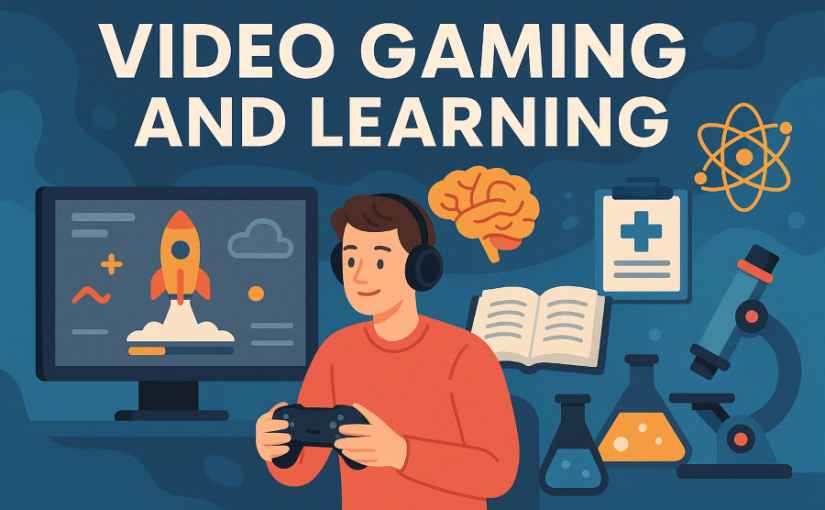When we think of video games, we often picture late-night matches, quick reflexes, and colorful graphics—not anatomy labs or operating rooms. But research is changing that narrative. Educators and researchers increasingly recognize the surprising ways video games can support learning and skill-building in medicine, health, and the sciences.
From boosting cognitive flexibility to improving surgical precision, video games—both commercial and educational—are emerging as unconventional yet effective tools for student and professional development in science and healthcare.
🧠 Gaming for Cognitive and Scientific Skill-Building
Scientific and health-focused learning demands more than memorization. It requires spatial reasoning, critical thinking, problem-solving, and quick decision-making—all of which are key elements in many video games.
For instance, real-time strategy and action games have been linked to enhanced attention control and working memory (Bediou et al., 2018). These are essential for students navigating high-stakes environments like chemistry labs or clinical simulations.
In a study published in Nature, researchers found that video game players had increased gray matter volume in regions of the brain associated with spatial navigation, memory formation, and strategic planning—key areas for medical learners (Kühn et al., 2014).
🔬 Video Games in Medical and Health Education
Gamified simulations are now being integrated into medical education to supplement traditional training. Here’s how video games are being used in health and science contexts:
- Surgical training: Video games have been shown to improve hand-eye coordination and motor skills relevant to laparoscopic surgery (Rosser et al., 2007).
- Emergency response: Games like Pulse!! help learners practice diagnosing and responding to medical emergencies in real-time (Kenny et al., 2007).
- Mental health education: Games such as SPARX and Depression Quest simulate mental health conditions to build empathy and emotional resilience.
Even in undergraduate education, games like Foldit—a protein-folding game—allow players to contribute to real biomedical discoveries (Cooper et al., 2010).
🏥 Enhancing Science Identity and Health Literacy
Video games can also promote science identity—a student’s belief that they can “be a science person”—by making scientific thinking feel accessible and engaging. This is especially true for students from underrepresented backgrounds in STEM.
Health-themed games are being used to improve public health literacy. For example, Re-Mission gives players control over virtual immune cells to fight cancer, helping young patients better understand their treatments and feel empowered (Kato et al., 2008).
👩⚕️ Careers, Gamers, and Future Physicians
For pre-med and health sciences students, video gaming might seem unrelated to career goals—but it doesn’t have to be. Many medical schools are investing in simulation-based learning and virtual reality tools to train students in a low-risk, interactive environment.
Soft skills developed through gaming—such as persistence, collaboration, and systems thinking—are essential in healthcare. And for those passionate about both health and gaming, fields like medical simulation design or health tech are growing career paths.
🎓 Final Thoughts
Video games aren’t just entertainment—they’re engines of learning, especially when applied intentionally in medicine and science. Whether you’re training for surgery, learning anatomy, or just exploring science through simulation, don’t discount the power of play.
So next time you sit down with a controller or keyboard, know that you might be building the very skills that could one day save a life—or help you ace that biology exam.
📚 References
- Bediou, B., Adams, D. M., Mayer, R. E., Tipton, E., Green, C. S., & Bavelier, D. (2018). Meta-analysis of action video game impact on perceptual, attentional, and cognitive skills. Psychological Bulletin, 144(1), 77–110. https://doi.org/10.1037/bul0000130
- Cooper, S., Khatib, F., Treuille, A., et al. (2010). Predicting protein structures with a multiplayer online game. Nature, 466(7307), 756–760. https://doi.org/10.1038/nature09304
- Kato, P. M., Cole, S. W., Bradlyn, A. S., & Pollock, B. H. (2008). A video game improves behavioral outcomes in adolescents and young adults with cancer: A randomized trial. Pediatrics, 122(2), e305–e317. https://doi.org/10.1542/peds.2007-3134
- Kenny, R. F., Andrews, G., Vignola, R., & Ritchie, D. (2007). Using a computer-based simulation game to improve learning in emergency response. Technology, Instruction, Cognition and Learning, 5(4), 291–305.
- Kühn, S., Gleich, T., Lorenz, R. C., Lindenberger, U., & Gallinat, J. (2014). Playing Super Mario induces structural brain plasticity. Molecular Psychiatry, 19(2), 265–271. https://doi.org/10.1038/mp.2013.120
- Rosser, J. C., Lynch, P. J., Cuddihy, L., et al. (2007). The impact of video games on training surgeons in the 21st century. Archives of Surgery, 142(2), 181–186. https://doi.org/10.1001/archsurg.142.2.181

Dennis Boakye ’26 is a junior with a major in Neuroscience and a minor in Mathematics. He is also a co-president of the Neurolawrence Club and the Synthetic Biology Club, and the treasurer for the American Medical Student Association (AMSA, Lawrence Chapter) and the Black Student Union (BSU). Dennis is the current career peer educator for the Health and Medicinal Professions (HMP) and the Physical and Natural Sciences (PHN) career communities at Lawrence University. Connect with Dennis on LinkedIn.



